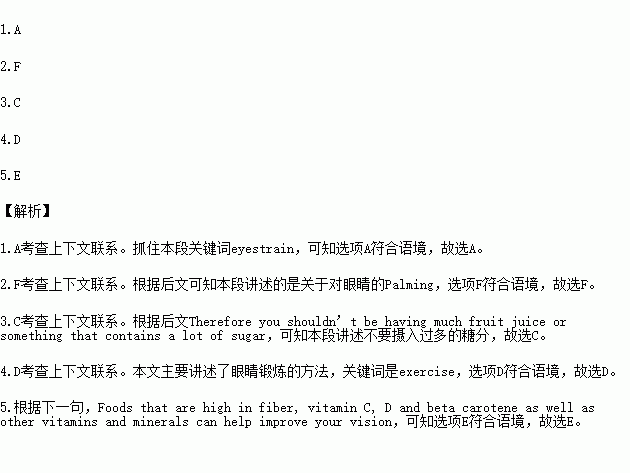题目内容
根据短文内容,从短文后的选项中选出能填入空白处的最佳选项。选项中有两项为多余选项。
How to Improve Eyesight Naturally
Eyes are important for everybody. You must take care and try everything in your hand to keep them in good condition. Here are some of the tips to improve your eyesight naturally.
1. Strain is known to be a factor in many health conditions and eyestrain(眼疲劳) is no exception. Try meditation, yoga or other methods of stress relief to improve your vision and overall health.
Sit upright in a comfortable chair. 2. Cup your hands so that there is no pressure on your eyes. Let your fingers rest across your forehead. There should be no light entering your eyes. Palming(手掌按摩)should be done for a period of 5 to 10 minutes to start. Palming should be relaxing. It may help to do palming in a darkened room.
3. It will unpleasantly affect your eyesight, which affects the eyes by producing a larger amount of insulin (胰岛素) in the blood. Therefore you shouldn’t be having much fruit juice or something that contains a lot of sugar.
The only exercise most eyes get is that daily rubbing we give them when we're tired or suffering from eyestrain. But eye exercises are actually good for your eyes and can improve your vision. 4. Blink as fast as you can for a few seconds then close your eyes tightly, open and repeat. Do this exercise 3 to 4 times daily.
You probably hear that statement all the time but eating the right foods are necessary to good health. 5. Foods that are high in fiber, vitamin C, D and beta carotene as well as other vitamins and minerals can help improve your vision. Here are a few foods that can be beneficial to good vision: carrots, eggs, blueberries, spinach, kale, grapes, and fresh garlic.
A. Reduce eyestrain.
B. Keep your eyes moist(湿的).
C. Sugar is your eye’s worst enemy.
D. Give your eyes a workout with the following exercise.
E. You may not be aware that your diet affects your vision but it does.
F. Close eyes and cover them with the palms of your hands.
G. Be sure to get plenty of sleep so your eyes don’t strain to stay open during the day.
 科学实验活动册系列答案
科学实验活动册系列答案A. A general sleep rule. B. The importance of sleep. C. A funny sleeping example. D. Different levels of sleep. E. The time we need for sleep. F. Different states of sleep. |
1.
Sleep, as we know, is important to us because it helps restore tired organs and tissues in our body. But how much sleep do we actually need?
2.
For most of us, eight hours seems to be about the right amount. Yet we know that there are a great many people who get along perfectly with less sleep and some who may even need more. A great deal depends on the way we live. But a good general rule to follow is to sleep as long as we have to in order to feel happy and be able to work at our best when we are awake.
3.
There are actually different levels of sleep. There is a deep sleep and a shallow sleep. In a shallow sleep our body does not get the same kind of rest as it gets in a deep sleep, so that after eight hours of a shallow sleep we may still feel tired. But a short deep sleep can be very restful.
4.
Alexander the Great was able to get a deep sleep whenever he needed it. Once, during the night before an important battle, he remained awake longer than anyone else. Then he wrapped himself in a cloak and lay down on the earth. He slept so deeply that his generals had to wake him three times to give command to attack!
5.
Normally when we go to sleep, our “ sleep center” blocks off nerves so that both our brain and our body go to sleep. One prevents us form wanting to do anything and the other makes our internal organs and limbs go to sleep. But someone will fall asleep (brain sleep) and keep on marching, because his body is not asleep!

